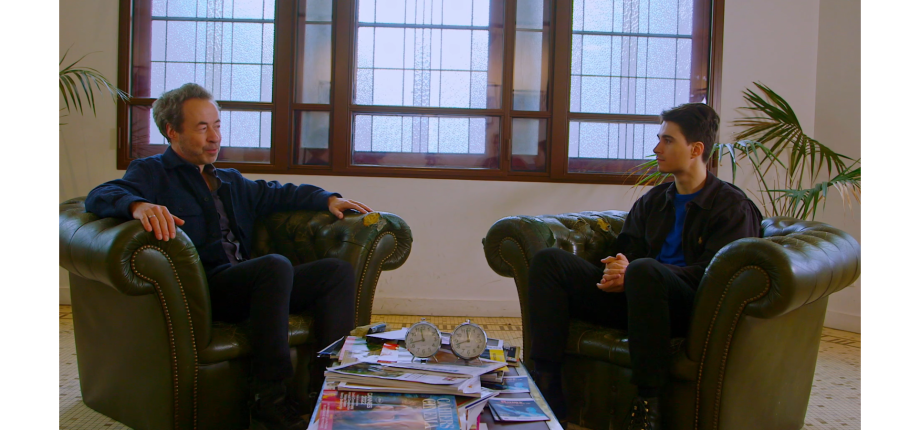The researcher, art, and self-improvement

Kenneth is the most handsome, intelligent man in the world, a male Barbie. From Elon Musk to the Pope, from his girlfriend to his mother, from Miss World to a media producer, everyone who meets him projects their fantasies onto him. But Kenneth wants to reclaim his life. So he runs away... This is the pitch for Kenneth Apocalypse***, the play written by Nicolas Girard-Michelotti following his meeting with Olivier Fournout, a researcher at I3-CRG and member of the steering committee of the interdisciplinary center SPIRAL (Sciences, Public, Imagination, Research, Art, all linked). "Through the diversity of the characters Ken encounters, the play shows that the model of perfection and success he embodies flows into very different worlds, becoming a structural figure of our society", explains Olivier Fournout.
Common structures and the prisoner's dilemma
For the past 10 years, the sociologist has been working on the culture of success as portrayed in management manuals, advertising, fiction and political discourse. "I study the resources we need to succeed in an environment where over-mediatization, social networks and work relationships encourage us to promote our egos and turn us into engineers of our own success". The researcher set about analyzing treatises on management and personal development, as well as Hollywood films, making no assumptions about what he would find. At the start of this project, American research studies illustrated management concepts with specific scenes from the cinema. Was it then possible to imagine that all these films presented common behavioral structures, applicable to any management or personal development book?
250 manuals and 500 feature films later, the researcher's hypothesis has become clearer. Most films, for example, share a paradoxical injunction derived from game theory and negotiation methods, according to which the protagonists must demonstrate an attitude that is both competitive and cooperative. "This is the prisoner's dilemma. The main character must negotiate and relate to others in cooperative forms, and at the same time fight against them or force his way through. It's negotiation with a gun to your head". This contradiction is also apparent in management books, sometimes under the lexical field of heroism, war or even death. "A bestseller from the early 2000s describes undesirable employees as "the walking dead", with the idea that they will leave of their own accord when the company is restructured. At the same time, the manual calls for 'teamwork'," points out Olivier Founout.
Towards a research project
In addition to analyzing existing and popular works, the researcher also relies on artistic creation to carry out his work, for example in the form of a novel (Germinata****). In the manner of an augmented reality device, art gives substance to subjects and raises the palette of emotions linked to the positions or values it induces, to critical, ethical or political dimensions. The piece Kenneth Apocalypse opens up new perspectives for Oliver Fournout's work. The writer's imagination and the embodiment of the actors bring him new elements, shaking up his research. Art offers a freer space for expression than a conventional scientific report would allow. "In 2013, the theatrical creation that Valérie Beaudouin (a visiting professor at Télécom Paris) and I supervised with our students around the controversy surrounding marriage for all, transformed the stage into a possible forum for exchange on a subject that was nevertheless unleashing passions", recalls the researcher.
Some research issues can also be addressed in unexpected ways through artistic creation. Such is the case with the fictional writing workshop that Olivier Fournout is launching in spring 2024 on the theme of "Once upon a time, there was another kind of agriculture". In partnership with the Zone Atelier Plaine et Val de Sèvre (CNRS/INRAE)***** and co-hosted by storyteller Frida Morrone, the sociologist brought together 22 participants from a wide range of backgrounds (farmers, breeders, researchers, students, authors, associations...). Objective: explore the agro-ecological transition, far from the intensive model in place since the post-war period. From these workshops, tales may emerge that will help us better understand the current divisive issues surrounding biodiversity and global warming. A new field of scientific investigation could also emerge. "In Canada and Great Britain, and now in France, an artistic work can be considered as research. It's called research-creation," concludes Olivier Fournout.
*I3-CRG: a joint research unit CNRS, Mines Paris - PSL, Télécom Paris, École Polytechnique, Institut Polytechnique de Paris, 91120 Palaiseau, France
** Le nouvel héroïsme, puissances des imaginaires, éditions Presses des Mines
*** Directed by Le sens des mots
**** https://cfeditions.com/germinata/
***** The Plaine et Val de Sèvre workshop area is a pilot site for analyzing the trajectories of biodiversity and agricultural practices, experimenting with new agroecological practices with farmers and new consumer behaviors with local residents. https://za-plaineetvaldesevre.com/
About:
Olivier Fournout is an HDR lecturer and researcher at the Institut Interdisciplinaire de l'Innovation at Telecom Paris. He works at the crossroads of culture and society, and is interested in the world of work, human relationships, the ecological perspective (which includes relationships), and what popular cultures can say and show about them.
*I³-CRG: CNRS, École polytechnique, Mines Paris-PSL, Télécom Paris, Institut Polytechnique de Paris, 91120 Palaiseau, France













